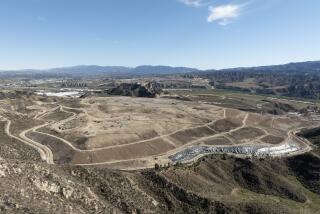Cities Assail Bid to Build Jail With Waste Funds
- Share via
In a move that would increase homeowners’ garbage bills a year early, the Board of Supervisors on Tuesday considered tapping a special fund to obtain money for a new jail but quickly ran into stiff opposition from cities throughout the county.
County staff members proposed transferring $15.6 million from Orange County’s enterprise fund for managing waste, where it can be used only for that purpose, to the general fund, where it could be spent for varied purposes.
There is $29 million in the waste fund, according to county staff members.
Earlier Higher Fees
To make up for the shifted money, trash haulers using the county’s four landfill sites would be charged higher fees in 1989, instead of 1990 as planned. The increase would be passed on to customers, so the typical monthly residential garbage bill of $6 to $7 would increase about 50 cents, according to county figures.
However, La Habra City Manager Lee Risner disputed the numbers presented to the supervisors by county staff members Tuesday. Risner, who represents the Orange County Division of the League of California Cities on the Waste Management Advisory Commission, said figures provided by the county earlier this year showed just $19 million in the waste enterprise fund.
The commission, most of whose members are appointed by the Board of Supervisors, and the League of Cities both voted to oppose the county’s move. The league sent a written protest to the supervisors, contending that the action would be illegal because of a landfill deal made five years ago.
Murry Cable, assistant county administrative officer, said in a memo to the supervisors that design and engineering work for a jail to hold up to 6,000 inmates will cost the county $9 million.
The supervisors are scheduled to pick a site for that jail July 15. But Cable said, “We do not (now) have identified monies in the budget necessary to undertake this top-priority project.”
Decisions on Same Day
Although the July 15 meeting is expected to be stormy, with residents near the four proposed jail sites likely to protest, the board decided to put off a decision on the $15.6 million until the same day.
Cable also pointed to the county’s overall poor financial outlook in recommending the transfer. The supervisors begin hearings July 29 on a bare-bones, $1.7-billion budget that may have to be balanced by laying off more than 200 county workers. The budget was tentatively approved by the board last month.
The money from the waste management enterprise fund could help cut the number of layoffs, officials said.
Until five years ago, the county operated the landfills and levied no charges.
“We were importing a lot of rubbish from out of Orange County because it was a free dump,” in fact the only free, county-operated dump in the state, said R.A. Scott, head of the county’s General Services Agency.
Much of the garbage “would come in from Los Angeles, San Diego and Riverside counties,” he said.
In 1982, the county decided to stop paying for the dumps out of its general fund. It announced a system of fees and established the enterprise fund, with revenues from the fund to be used only for waste management.
Called Start-Up Costs
The written statement from the League of Cities, which was drafted by Risner, argued that the county’s transfer of land, buildings and cash to the waste management enterprise fund in 1982 was intended to be the county’s share of start-up costs for the new landfill operations.
But the county has called the assets a “loan,” now worth $15.6 million with interest.
For the single fiscal year that ended June 30, the waste management enterprise fund had an operating surplus estimated at $2.7 million, according to county figures.
In that year, county figures indicate that $27 million in fees was paid into the fund by those who used the landfills at Olinda in Brea, Prima Descheca off Ortega Highway in southern Orange County, Coyote Canyon in Irvine and in Santiago Canyon.
The Coyote Canyon facility is to close in late 1988, and a new Bee Canyon landfill is to open then. The Santiago Canyon facility is scheduled to close soon after.
Risner said that in 1982, the estimated cost was $10 million to close Coyote Canyon and ensure that the fill did not pollute air or water supplies in the surrounding area. He said that cost is now up to $20 million and eventually may reach $25 million.
The enterprise fund, enhanced by any operating surpluses racked up each year, would be used to cover the cost, he said, delaying as long as possible the raising of dumping fees at the landfills.
More to Read
Sign up for Essential California
The most important California stories and recommendations in your inbox every morning.
You may occasionally receive promotional content from the Los Angeles Times.










